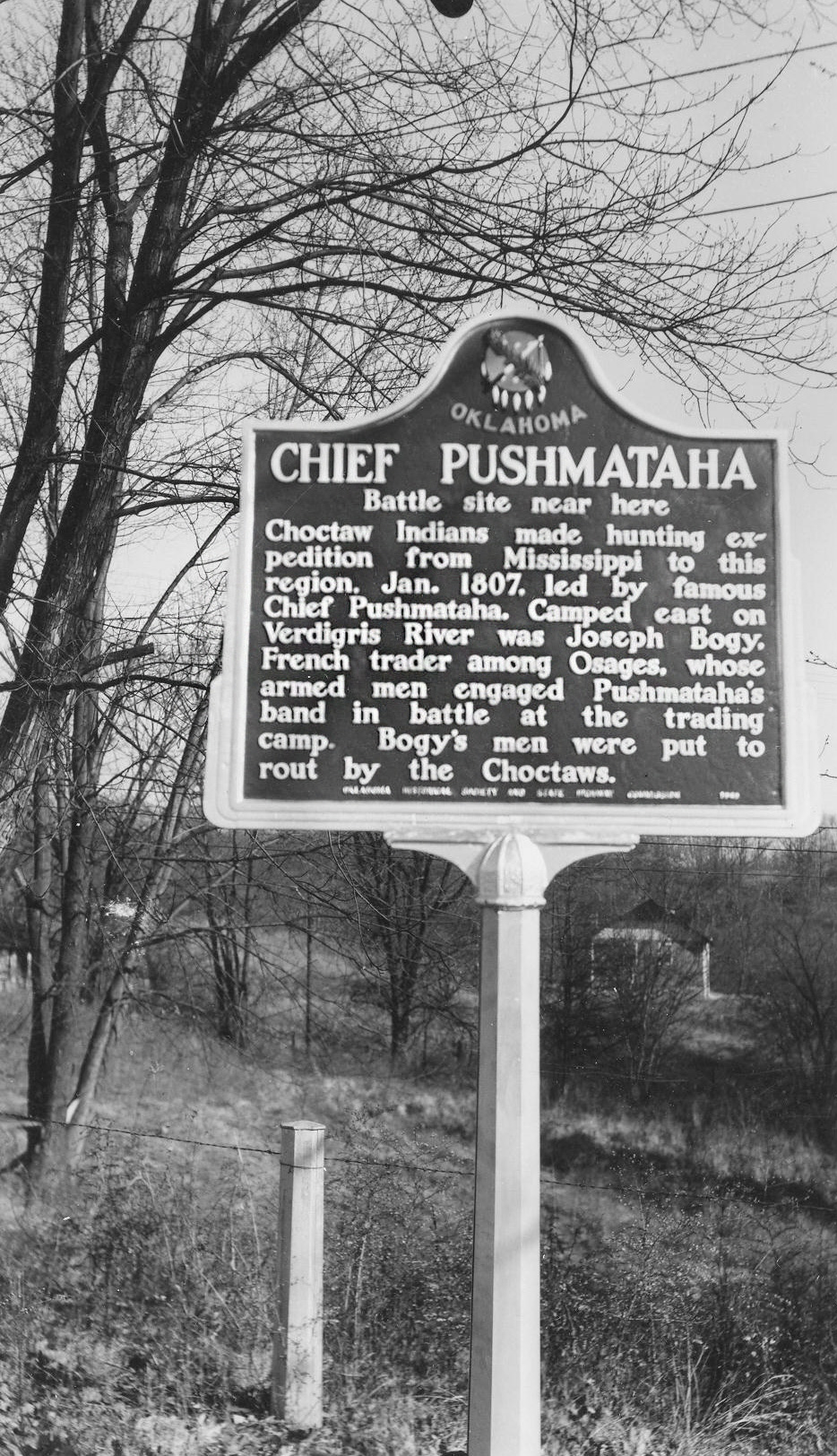
Historical Marker Program
Search Results
Your search returned 8 results.
Chief Pushmataha
Wagoner CountyLocation: on US-69, 1/4 mile north of Arkansas River bridge
Material: Granite
Topics: American Indians; Recreational/Service; Social/Cultural; Westward Expansion, 1803–1861
Chief Pushmataha led a Mississippi Choctaw hunting expedition to the area in January of 1807 and attacked armed men under the leadership of French trader Joseph Bogy. Pushmataha County, in southeastern Oklahoma, is named for this great Choctaw leader.

First Brick Building
Wagoner CountyLocation: on OK-51 in downtown Wagoner
Topics: Urban Development
The first permanent brick building in Wagoner stands at this site.
Koweta Mission
Wagoner CountyLocation: on US-69, 1/4 mile north of Arkansas River bridge
Topics: American Indians; Settlement Patterns; Westward Expansion, 1803–1861
Reverend R. M. Loughridge founded this Creek Indian school in 1843 and named it for an ancient Creek town in Alabama.

Oklahoma’s First Baptist Church
Wagoner CountyLocation: on US-69, 1/4 mile north of Arkansas River bridge
Topics: Religion/Philosophy; Westward Expansion, 1803–1861
A Baptist congregation was established here in 1832.
Texas Road
Wagoner CountyLocation: on OK-16 north of Verdigris River in Okay (DAR)
Sponsor(s): Daughters of the American Revolution
Topics: American Indians; Arts; Indian and Frontier Trade; Transportation; Westward Expansion, 1803–1861
A monument commemorates the Texas Road, the most ancient trail through Oklahoma, the Three Forks trading post, the Creek and Osage agencies, and Washington Irving's visit to the area.
Tullahassee Mission
Wagoner CountyLocation: on US-69, 1/4 mile north of Arkansas River
Material: Aluminum
Topics: American Indians; Civil Rights; Education; Government; Religion/Philosophy
Tullahassee was established as a Creek mission by Presbyterian Reverend R. M. Loughridge in 1848. Alice Robertson, later Oklahoma's first congresswoman and the first woman postmaster in America, was born here.
Wagoner
Wagoner CountyLocation: at intersection of US-69 and OK-51 in Wagoner
Material: Granite
Topics: Education; Urban Development; Westward Expansion, 1803–1861
In 1896, Wagoner became Indian Territory's first incorporated town. The following year, the territory's first public schools began here.
Wigwam Neosho
Wagoner CountyLocation: on US-69, one mile north of Arkansas River bridge
Material: Granite
Topics: American Indians; Folklife; Indian and Frontier Trade; Westward Expansion, 1803–1861
Wigwam Neosho was a trading post from 1829–33, named and operated by Sam Houston, Ex-Gov. of Tennessee and future president of the Republic of Texas. Houston was called Colonneh (The Raven) by his Cherokee friends. American author Washington Irving visited Houston in 1832 as he made notes for his book, A Tour of the Prairies, now an Oklahoma classic.

(Page 1 of 1)
Marker Search
Browse by County
Alfalfa County
Atoka County
Beaver County
Beckham County
Blaine County
Bryan County
Caddo County
Canadian County
Carter County
Cherokee County
Choctaw County
Cimarron County
Cleveland County
Comanche County
Cotton County
Craig County
Creek County
Custer County
Delaware County
Dewey County
Ellis County
Garfield County
Garvin County
Grady County
Grant County
Greer County
Harmon County
Harper County
Haskell County
Hughes County
Jackson County
Jefferson County
Johnston County
Kay County
Kingfisher County
Kiowa County
Latimer County
Le Flore County
Lincoln County
Logan County
Love County
Major County
Marshall County
Mayes County
McClain County
McCurtain County
McIntosh County
Murray County
Muskogee County
Noble County
Okfuskee County
Oklahoma County
Okmulgee County
Osage County
Ottawa County
Pawnee County
Payne County
Pittsburg County
Pontotoc County
Pottawatomie County
Pushmataha County
Roger Mills County
Rogers County
Seminole County
Sequoyah County
Stephens County
Texas County
Tillman County
Tulsa County
Wagoner County
Washington County
Washita County
Woods County
Woodward County
To find out more about the Oklahoma Historical Society Historical Marker Program or how to submit an application, please visit the Historical Marker Program page.
Missing or Damaged Markers
Please use our online form to report missing or damaged historical markers.
Report Missing or Damaged Markers
Contact Us
If you have questions, please contact:
Matthew Pearce
Oklahoma Historical Society
800 Nazih Zuhdi Drive
Oklahoma City, OK 73105
405-522-8659
matthew.pearce@history.ok.gov





